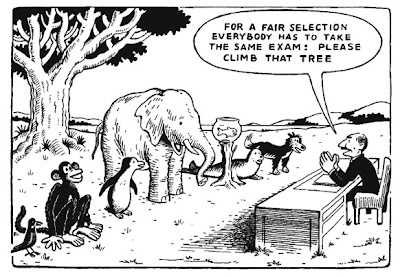“If I’d been required to take those two tests when I was a 10th grader, my life would almost certainly have been very different. I’d have been told I wasn’t ‘college material,’ would probably have believed it, and looked for work appropriate for the level of ability that the test said I had.
“It makes no sense to me that a test with the potential for shaping a student’s entire future has so little apparent relevance to adult, real-world functioning. Who decided the kind of questions and their level of difficulty? Using what criteria? To whom did they have to defend their decisions? As subject-matter specialists, how qualified were they to make general judgments about the needs of this state’s children in a future they can’t possibly predict? Who set the pass-fail 'cut score'? How?”
“I can’t escape the conclusion that decisions about the [state test] in particular and standardized tests in general are being made by individuals who lack perspective and aren’t really accountable.”
In a nutshell:
I don't know the answer. But while "standardized testing" has become an evil word in American education, we continue to use it, flaws and all. And the problem intensifies lower down in the socioeconomic food chain. At this point, you'd better hope you're a monkey.


No comments:
Post a Comment